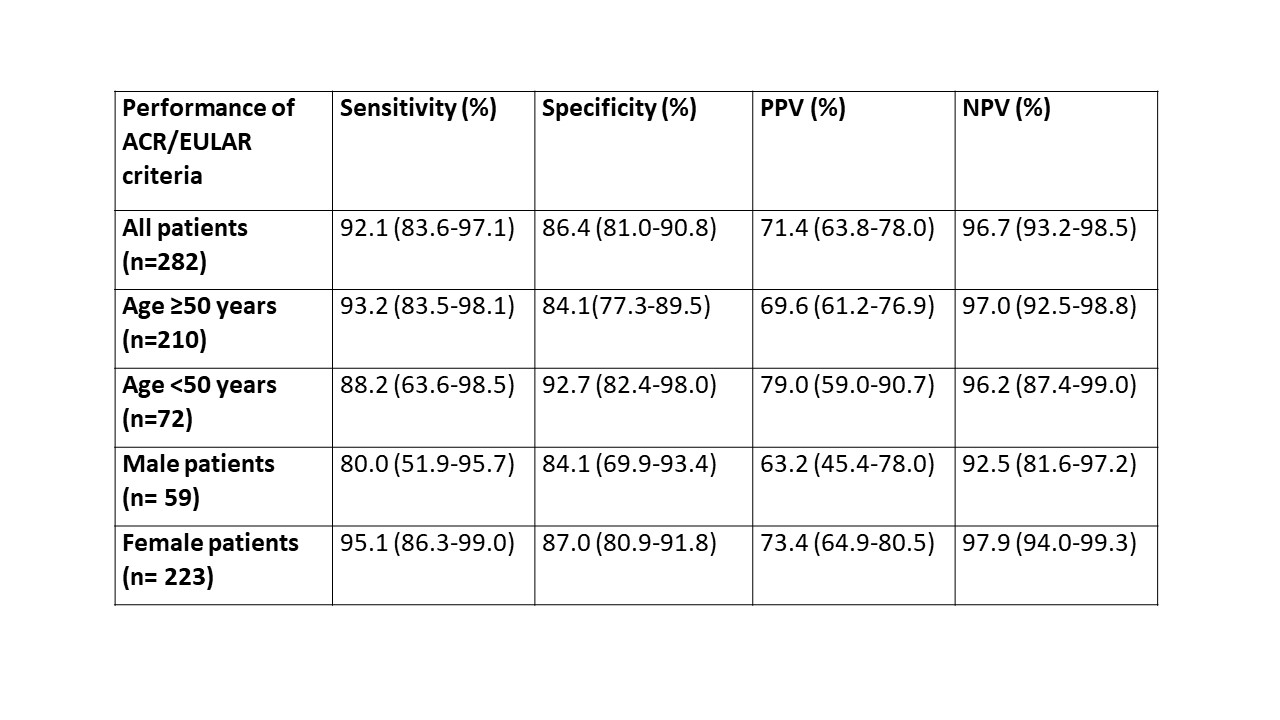Session Information
Date: Sunday, November 7, 2021
Title: RA – Diagnosis, Manifestations, & Outcomes Poster II: Miscellaneous Aspects of RA (0786–0812)
Session Type: Poster Session B
Session Time: 8:30AM-10:30AM
Background/Purpose: To shorten the waiting time to see rheumatologists, a nurse-led triage clinic was established in our hospital in September 2018 to triage new referrals for peripheral joint symptoms. Patients who were assessed to fulfil the ACR/EULAR criteria for rheumatoid arthritis (RA) were channeled for an early appointment while others a routine appointment in the rheumatology clinics. The objective of this study is to validate the performance of the 2010 ACR/EULAR classification criteria of RA in a nurse-led triage clinic.
Methods: Adult patients who presented with peripheral joint pain and referred to the medical clinics of Tuen Mun Hospital, Hong Kong between October 2018 and October 2020 were studied. Patients were seen face-to-face by a designated rheumatology nurse specialist (CMT) for assessment of the medical history, fulfillment of the ACR/EULAR RA criteria and the number of tender and swollen peripheral joints. A final clinical diagnosis of RA made by the attending rheumatologists was regarded as the standard and the performance of the ACR/EULAR criteria for RA was validated by a 2×2 contingency tables according to a diagnosis of RA (“condition positive”) and criteria fulfilment (“test positive”) using standard formulas (sensitivity = true positive/[true positive+false negative]; specificity = true negative/[true negative+false positive]); positive predictive value (PPV) = true positive/true positive+false positive; negative predictive value (NPV) = true negative/true negative+false negative).
Results: A total of 336 patients were seen in the nurse-led clinic during the specified period. 51 patients were excluded because they were diagnosed to have RA by other specialists or private rheumatologists. Finally, 282 patients were studied (223 women [79%]; age 55.2±11.9 years [18-88]). All except 4 patients were ethnic Chinese. 73 (25.8%) patients were anti-CCP positive, 123 (43.5%) patients were rheumatoid factor (RF) positive, and 28 (9.9%) patients had more than 10 joints involved. A total of 98 patients fulfilled the ACR-EULAR criteria, 78 (79.6%) of whom were diagnosed clinically as RA by rheumatologists. The clinical diagnosis of patients who fulfilled the ACR-EULAR criteria but not clinical RA were: osteoarthritis (n=14), psoriatic arthritis (n=3), fibromyalgia (n=3), undifferentiated connective tissue disease (n=2), lupus (n=1), scleroderma (n=1) and others (n=4). The sensitivity and specificity of ACR/EULAR criteria for RA was 92.1% and 86.4%, respectively. Subgroup analyses showed that the ACR/EULAR RA criteria was less sensitive but more specific in younger patients (< 50 years). Both the sensitivity and specificity of the ACR/EULAR criteria for RA was lower in male patients.
Conclusion: The performance of the 2010 ACR/EULAR criteria for triage purpose in our nurse-led triage clinic is satisfactory. The higher specificity and sensitivity of the criteria as compared to other European and Asian cohorts is possibly related to the longer duration of joint symptoms in our patients before nursing assessment.
To cite this abstract in AMA style:
Tsang C, Mok C, Chan K, TSE S, Ho L. Validation of the 2010 ACR/EULAR Classification Criteria of Rheumatoid Arthritis (RA) in a Nursing-led Triage Clinic [abstract]. Arthritis Rheumatol. 2021; 73 (suppl 9). https://acrabstracts.org/abstract/validation-of-the-2010-acr-eular-classification-criteria-of-rheumatoid-arthritis-ra-in-a-nursing-led-triage-clinic/. Accessed .« Back to ACR Convergence 2021
ACR Meeting Abstracts - https://acrabstracts.org/abstract/validation-of-the-2010-acr-eular-classification-criteria-of-rheumatoid-arthritis-ra-in-a-nursing-led-triage-clinic/

